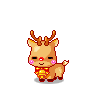Takaramono wa Hako no Naka
Sequel to Takaramono wa Hako no Naka, this doujinshi explores the complications of a painful past on Tokura and Gin's sex life, and how they overcome it. Gin's ongoing consideration for his partner is lovely indeed, but I can't say that I found it hot and I'm not exactly sure what brought the temperature down from boiling to light simmer. I think that there was so much carefulness and tiptoeing around, it interfered a bit with the sheer animalistic, irrational self-surrender of romance. It's crucial for loving relationships in real life, but not so great for escapist fiction as it feels a bit sex-averse.
Itoshii, To Iu Koto
Three short stories whose primary linking theme is desire, on the part of the seme, to the point of possessiveness, whether the uke is sought by other men or monopolized by his work. The response is occasionally violent, and usually demanding — not really my cup of tea, but consistent throughout. The artwork is incredibly beautiful, whether contemporary or historical, just enough to transcend the rough handling of the stories themselves.
Fukigen Kareshi no Nadamekata
Corollary to Kuroneko Kareshi no Itoshikata, the fourth installment to the popular werecat series by Sakyou Aya. When parental pressures complicate the love-lives of leopards, maybe it's time to let the castles and servants go. As expected with Sakyou Aya, there is lots of sex, but the focus is on the heart.
Stellarium
A mysterious laboratory where stars are made; a scientist whose dead lover haunts him; a child whose encouragement pulls him through despair. Aoi Aki's stories are intense and, as always, so beautifully drawn and depicted. In this one, the birth of stars is linked to the rekindling of love.
The end of youth ~Ai no, Uta~
Shinichi, a one-hit wonder of a former pop-idol, comes crashing against his disappointed and unfulfilled dreams, just at the point where he reunites with Chikara, an overbearing and caustic junior whose feelings he once played around with, and who he abandoned to have a go as a musician. Ai no, Uta is a sad and bitter story about artists and the free market, and about being both unsupportive and unsupportable as a person. Shinichi's ego is something to behold, but I don't necessarily agree with Chikara that he should abandon his music, either, since it's wrapped up with his soul. It doesn't seem like Shinichi's reunion with Chikara is a stroke of luck, either, although it correlates with the walloping message that the universe is sending to him about what everyone thinks about his musical skill. Chikara is extreme, and while it isn't his job to suckle Shinichi's ego, his determination to crush his dreams borders on abusive. The brother drops hints about mental-emotional illness. In any case, the story ends without resolution beyond Shinichi's epiphany of self-realization and, at the same time, self-loathing, and sometimes, that's all there is to a story. It's a good story, but there isn't an ounce of comfort or kindness in it — kind of like, both, Shinichi and Chikara. One can imagine they might learn something from that ... or not.
Lovers Doll
Shimeji, known as the Bloody Doll, comes to life as a result of his master's love. Unfortunately, only one of his masters was pleased by this. One of Mishima Kazuhiko's best stories.
Tooi Nemuri
These two stories gave me pause. They are interesting, but tough, and more realistic, than romantic, with bittersweet resolutions. (1) Chizumi's postpones dealing with his unresolved feelings for a dead friend by raising the friend's son, Ibuki, and having grief-relief sex with his other friend, Yatabe. When Ibuki confesses, Chizumi indulges his infatuation far too much for my personal comfort, but he does realize his mistake and takes action to correct it. Unfortunately, it throws his entire motive for rearing Ibuki into the realm of exploitation, rather than a sincere concern for his well-being, and he wounds Ibuki with, both, the inevitable rejection and the wildly disparate balance of power (Ibuki being completely dependent and vulnerable in their situation.) Realistically, people do betray ones who love them this way, without atoning or making amends, but it leaves a bitter aftertaste. Not quite as bitter as (2) the relationship between Kazuhi and Ichiyama, where atonement is expressed through violence. Yamakami Ryou's stories have an unsettling sense of personal contradiction, with pain and betrayal at the heart, but they are insightful and highly readable dramas, well worth the time and effort.
Sora To Hara
Harasen, the lonely music teacher, whose crush on student, Sajou Rihito, in mangaka Nakamura's Doukyuusei series went nowhere (in no small part as a result of his own scruples; Harasen doesn't touch students), attracts the attention of another student, Sorano. Sorano is fascinated, but blocked by the same scruples, and tries in his clumsy and inexperienced way to make things right between Harasen and Sajou, and, when that does not work, to console and heal him as far as Harasen will let him. The question is how far is that, and are Harasen's scruples real, or a mask for cowardice?












Hydra